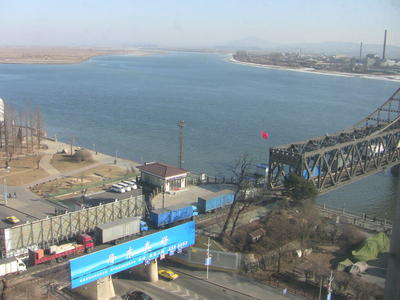The company in question is Xiyang, and in early August it began to openly complain about North Korean actions that had allegedly cost it some US$55 million.
Unlike in the past, the Chinese government has done nothing to silence these voices of dissatisfaction. There is even good reason to believe that the Chinese authorities have quietly approved Xiyang’s decision to make the dispute public.
Yet North Korea has not remained silent on the issue. On 5 September, the Korean Central News Agency — North Korea’s official news service — accused Xiyang of supporting forces hostile to the North Korean state and of spreading malicious propaganda.
What should we make of this confrontation? It is tempting to present the event as a sign of impending (or at least a possible) crisis in Sino–North Korean relations. This is, however, a massive overreaction; trade between the two countries continues to grow rapidly and official inducements by the Chinese government continue to play a major role in this relationship. It is thus highly unlikely that the Xiyang controversy will make China’s top leadership re-evaluate its North Korea policy.
If this is indeed the case, why did the heavily censored Chinese media report on the controversy? Of course, there might be domestic political reasons, for instance the political leverage of the Xiyang Group in China. But domestic factors may not be all that significant.
The Xiyang Group is by no means the first Chinese business to lose substantial sums of money in dealing with North Korea. North Koreans have a well-deserved reputation as notoriously bad business partners; in the past couple of decades, not only Chinese but also Soviet companies were cheated or let down by their North Korean partners, even though they have seldom suffered damage on such a scale.
It would be an oversimplification to say that the Chinese simply decided they have had enough. Nonetheless, it seems that some people in Beijing believe that now is a good time to send a signal to North Korea in order to show that China will not remain passive and forgiving in all cases. This message is particularly important because the new leadership in Pyongyang has begun to look for money to finance various reform programs they would eventually like to implement. China is likely to be their main source of funding, and thus many in Pyongyang understand that now is not a good time to quarrel with Beijing. And perhaps this is exactly the reason why the Xiyang dispute was made public.
That said, one should not expect that the recent dispute will significantly or dramatically change relations between the two countries. China needs a stable North Korea and this is not going to change. For the last few years China has been by far the most important sponsor of the North Korean state. And this policy makes perfect sense from China’s strategic perspective.
Andrei Lankov is Professor at Kookmin University, Seoul, and an adjunct research fellow at the Australian National University.

